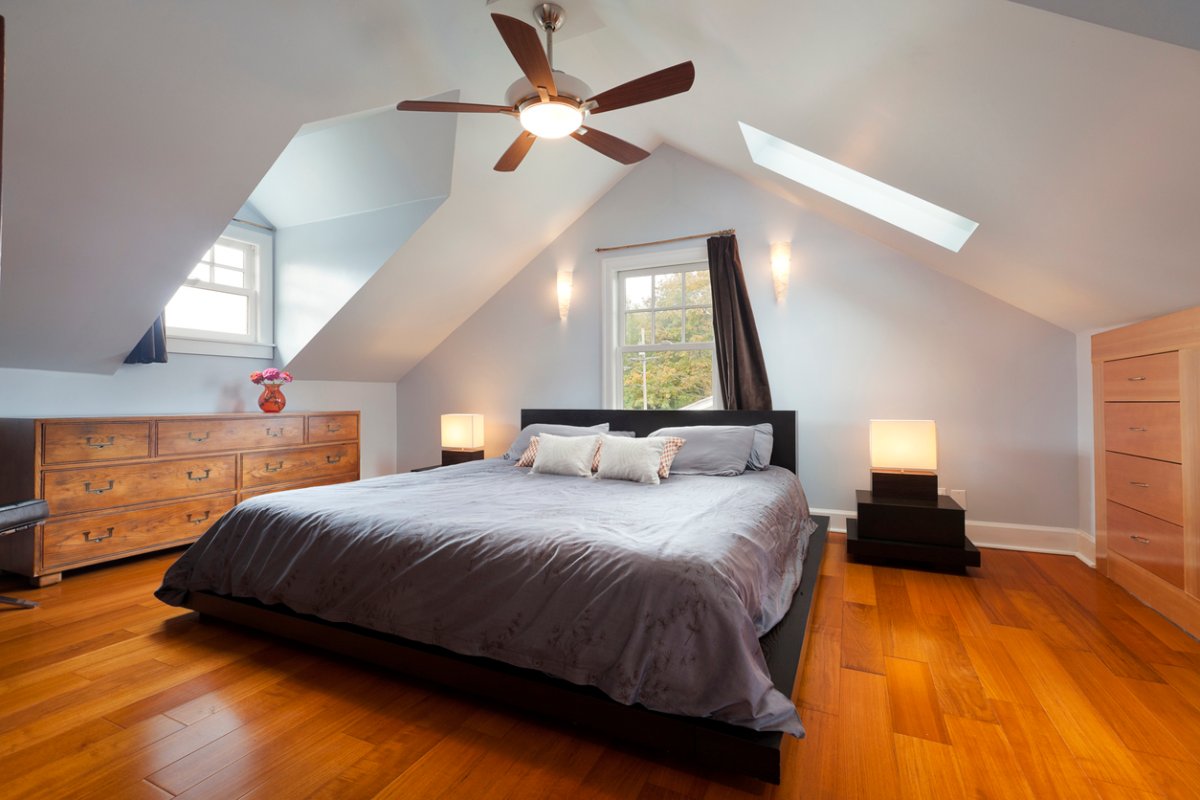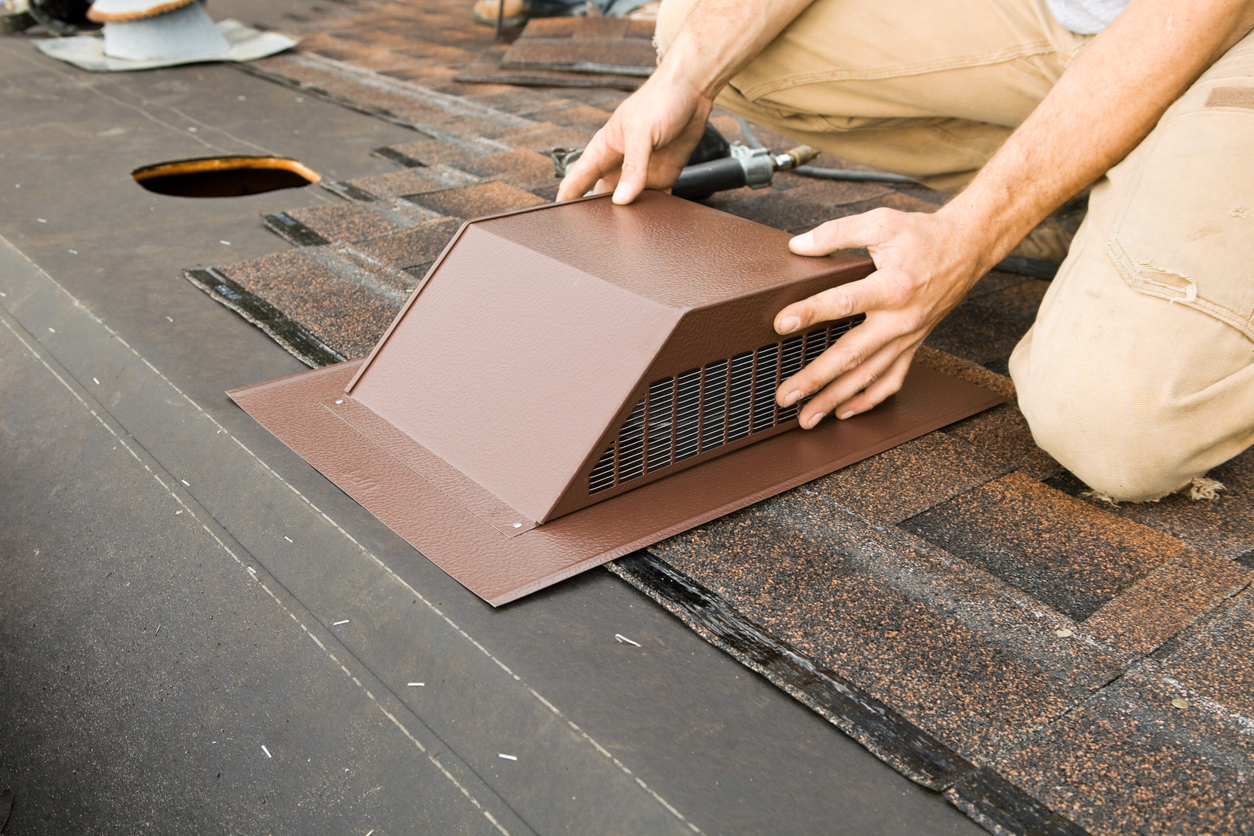

We may earn revenue from the products available on this page and participate in affiliate programs. Learn More ›
Q: My attic fan is starting to make weird noises and I’m not sure it’s working right. I think it needs to be replaced, but I’m not sure who installs attic fans. Do I call an HVAC technician or a roofer?
A: Attic fans may seem like an inconsequential part of the house, but they do a tremendous amount to aid in attic ventilation and reduce strain on a home’s HVAC system. You’re right to consider calling a roofer if your attic fan is showing signs of wear and tear. A roofer is especially helpful if you currently have a roof-mounted attic fan that needs to be replaced. When you need someone who installs attic fans, you may also need to contact a handyperson, a carpenter, or an electrician, depending on the fan and your home. If any new wiring is required, an electrician might be the first person you’ll want to call. On the other hand, a gable-mounted fan can be fixed or installed by a skilled carpenter. A handyperson can tackle the task of basic attic fan replacement. Keep reading to figure out exactly who you should call.
A roofer can install a roof-mounted attic fan.
It makes the most sense for a professional roofer to handle a home’s roof vent installation, since it’s a job they probably take on often. A roofer is the best choice for installing a new roof-mounted fan, since they’ll need to cut a hole into the roof and seal the area surrounding the fan once it’s installed. Then, the roofer will need to put new shingles in place or patch the hole with whatever other roofing materials they deem necessary. Even when a homeowner needs to replace an old roof-mounted fan, shingle repair and replacement or new flashing might be required, so a roofer may still be the pro to call to tackle this job.

You’ll need to hire an electrician if any new wiring is required.
Whether a homeowner needs an existing attic fan replaced or one installed where there wasn’t one before, if new wiring is involved, it’s best to hire a licensed electrician for this project. They’ll not only be able to install your attic fan more efficiently, but they’ll have the right tools and equipment to do the job safely and correctly. Although attic fan installation may seem like a simple DIY to tackle, any new wiring should be put in place by someone who is fully aware of the risks involved and is trained, insured, and bonded.
A carpenter can help with any structural changes or additional framework if needed (like for a gable-mounted fan).
Those who want to install or replace a gable fan may need the help of a carpenter. Since a gable-mounted fan is often bigger than a roof-mounted fan, it may need more structural support that requires the unique skill set, knowledge, and experience of a trained carpenter. A carpenter can build the necessary framework to ensure the fan is securely in place for years to come. If there is already a gable vent in place, this may not be as complicated an installation, but a homeowner may still benefit from a carpenter’s skill and feedback to ensure that the existing structure is still sufficient.

A handyperson can tackle an attic fan replacement.
If a homeowner just needs to replace an outdated or broken attic fan but isn’t comfortable doing it themselves, they can call a handyperson to tackle this task. With no new wiring, roof repair, or structural changes, the job can be as simple as turning off the power, taking the old fan out, inserting the new fan’s circuit cable, connecting the wires, and securing the fan in place. And since the best attic fans can last up to 15 years, this type of installation is one that won’t need to be done often.
Attic fans can prevent roof damage and minimize the load on an HVAC unit.
The quality of a home’s ventilation can make the difference between an overworked HVAC unit and one that has better longevity thanks to an efficient attic exhaust fan. Attic fans also draw hot, moist air out of the attic, minimizing mold, mildew, or allergens that are harmful to inhale. Plus, an attic vent fan prevents ice in the winter and humidity in the summer, which can prolong the lifespan of the roof and keep damage from mold or mildew at bay.

Attic fans are cheaper to install, but whole-house fans can raise your home’s value.
Although it may cost more up front, installing whole-house fans can put a homeowner in a better position in the future by raising the value of the home, should they ever put it on the market. While both fans help ventilate the home and cool down a space, an attic fan only draws in cool air in the attic. A whole-house is mounted between the living space and the attic, and it circulates air from the entire home and pushes it out through the attic. A whole-house fan can cost anywhere from $300 to $1,400 for the fan itself, but it may be more appealing to potential buyers who prefer a cooler, more efficient home that won’t need to rely as heavily on an air- conditioning unit.

It costs an average of $350 to $900 to install an attic fan.
Attic fan installation can typically cost anywhere from $300 to $900. The amount of labor it takes to install the fan is a big factor in the final cost, ranging anywhere from $100 to $500 for more extensive jobs. A new attic fan itself can cost as little as $80 for a basic model or up to $500 for electric or solar models. Homeowners may also want an attic fan thermostat, which controls when the fan turns on and can cost $100 for installation alone. If a homeowner decides to go with whole-house fan installation, they can expect to spend $700 to $2,700 for both the equipment and the labor.
Homeowners will want to get at least three estimates when looking for attic fan installation.
Since this is a job that requires the expertise of a handyperson, a roofer, an electrician, or a carpenter, it’s best to get multiple estimates to get a better idea of how much professionals in your area are charging and what is included in the price. Three estimates at minimum will likely give you a good range so you can compare prices and know which company or professional will provide the best bang for your buck.
Sources: HomeAdvisor, HomeGuide
